|
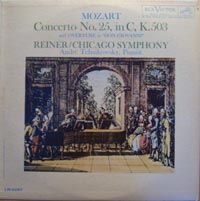
RCA Victor USA Cover Art
(Mono)
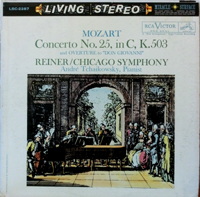
RCA Victor
USA Cover Art
(Stereo)
(Used for CD 40 of 63)
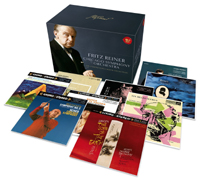
RCA Victor 370198 (63 CDs)
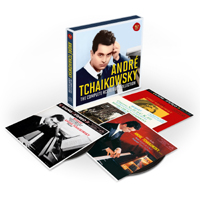
RCA/Sony
Classical Box Set
Sony 88985470142 (CD2)
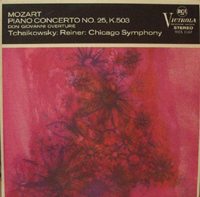
RCA Victor UK Cover Art
(Stereo)
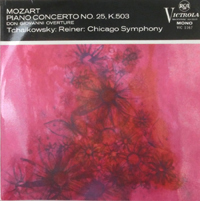
RCA Victor UK Cover Art
(Mono)
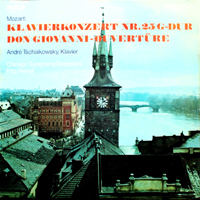
RCA Victor
German Cover Art
(Stereo)
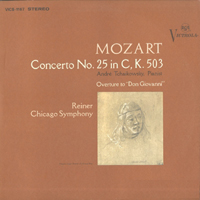
RCA Victor UK PlumCover Art
(Stereo)
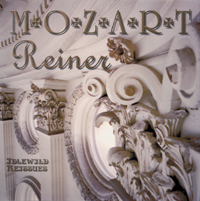
Idlewild Reissue CD Cover Art
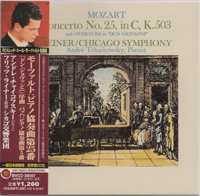
BMG Reissue
CD Cover Art
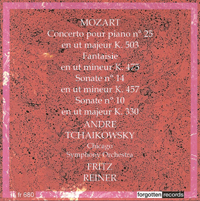
Forgotten
Records CD Reissue Cover Art
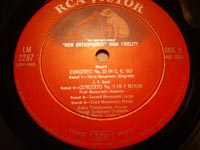
Original Side 2 Record Label
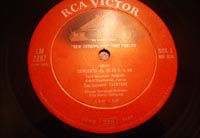
Revised Side 2 Record Label
|
RCA
Victor LSC-2287 (Stereo)
RCA Victor
LM-2287 (Mono)
RCA Victor VICS-1167 (Stereo) (UK)
RCA Victor VIC-1167 (Mono) (UK)
RCA
Victor VICS-1167 (Stereo) (German)
RCA Victor 370198 - Complete RCA Reiner Recordings (CD 40 of 63)
Idlewild Records JDLR 116
RCA Victor/BMG BVCC-38397
Forgotten Records fr-680 (Click
Here for purchase information)
RCA/Sony
Classical 88985470142 (CD box set, CD2)
Mozart Piano Concerto No. 25 (K.503)
Chicago Symphony Orchestra, Fritz Reiner
Cadenza by André Tchaikowsky
Music
/ MP3
Mozart
- Piano Concerto No. 25 (K.503)
1. Allegro
Maestoso 01_mozart_k503_concerto_1mvt.mp3
2. Andante 02_mozart_k503_concerto_2mvt.mp3
3. Allegretto 03_mozart_k503_concerto_3mvt.mp3
Review
on MusicWeb International Website
A review of the CD reissue of this record by Forgotten
Records (fr-680)
appeared on the MusicWeb
International website on March 4, 2014. Written by Stephen Greenbank,
this review includes: "Tchaikowsky achieves a beautiful translucent,
bell-like tone. The finale is carefree, joyous and relaxed. One can
only marvel at the pianist’s pearl-like finger-work and evenness
of tone."
Read More.
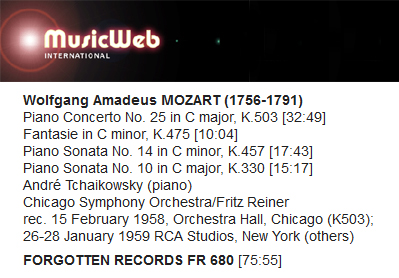
Recording
Date(s):
February
15, 1958
Recording
Location:
Chicago,
Ill. USA (Orchestra Hall)
Release
Date:
March,
1959
Reissue
Date (Idlewild Records):
March, 2002
Reissue
Date (RCA
Victor/BMG):
November, 2006
Reissue
Date (Forgotten
Records):
May, 2012
Also includes content of RCA
Victor LSC-2354 (Stereo)
Known
Details:
Originally,
this LP record was to include two works featuring André Tchaikowsky:
the Mozart piano concerto No. 25, and the Bach piano concerto No. 5.
Both works were recorded on February 15, 1958 and the record was to
be released to the market in March, 1959. At the last minute, André
Tchaikowsky rejected the Bach performance, requiring RCA to find an
alternative work for the record, in this case, replacing the Bach concerto
with the Mozart Overture to "Don Giovanni." Since the Mozart
Overture was recorded on March 15, 1959, the very month this record
was to be issued, it is completely possible that replacing the Bach
with the Mozart Overture was an emergency situation.
However,
a number of the record labels had already been printed showing the Bach
concerto on Side 2 and only in the nick of time were they able to rework
the record jacket art to reflect the deletion of the Bach. The result
was that the initial offering of this recording still showed, on the
record label Side 2, the Bach concerto (click the image on the left
panel) when it was actually the Mozart Overture. In subsequent production
cycles, the "error" was fixed and Side 2 showed the Mozart
Overture.
Oddly enough,
an RCA Victor/BMG CD BVCC-38397 (Japan) was released in on November
22, 2006 that did include both the Mozart piano concerto No. 25 and
the Bach piano concerto No. 5 as had been planned for so many years
previously. Of all the André Tchaikowsky recordings, this is
the only one that is readily available for purchase (see: http://www.cdjapan.co.jp
and search for Tchaikowsky).
The Mozart
and Bach concertos were featured in a live Chicago Symphony Orchestra
concert on 11 February 1958, while the recording is from 15 February
1958. The original pianist scheduled for the symphony concert was Clara
Haskil, but she became ill and was unable to play. André agreed
to both play in her place and to play the scheduled concertos. Arriving
in Chicago only a few days before the performance, André's first
stop was a music store where he bought the scores for both the Mozart
and the Bach concertos and then went to the first rehearsal.
It was
during this first rehearsal that
conductor Fritz Reiner leaned over towards André and said something
like, "my boy, you play beautifully," where André replied,
"I'm sight reading and I've never played this before." Reports
are that Reiner came nearly unhinged to think that a pianist would come
unprepared to his orchestra, the greatest orchestra in the world. In
his book, Fritz Reiner: A Biography by Philip Hart, Hart confirms
the incident on page 198:
"If
Reiner liked a soloist, as he did such young Americans as William
Kapell, Byron Janis, Eugene Istomin, and Van Cliburn, the collaboration
was a happy one. On the other hand, Chicago flutist Donald Peck recalled
a recording session with the young Russian [should be Polish] pianist
André Tchaikowsky. And Tchaikowsky was bouncing around and
buttering up to Reiner... But during the middle of the recording session
[of Mozart's Concerto in C, K. 503], Tchaikowsky said, 'You know,
Dr. Reiner, I've never played this concerto before.'... Reiner said,
'WHAT? You've never played this, and you DARE to come here and record
this with me and my orchestra?' After that, Tchaikowsky couldn't do
anything right."
After three
rehearsals, André had memorized the music and for the concert,
played without a score, plus he improvised the cadenza in the 1st movement,
a feat he repeated for the recording session. Of the concert, the Chicago
Daily Tribune music critic, Claudia Cassidy wrote on February 12,
1958:
André
Tchaikowsky, the young Polish pianist whose recital and record debuts
stirred such hope for the future, underscored the validity of that
reaction when he played Mozart and Bach yesterday with Fritz Reiner
and the Chicago Symphony orchestra in Orchestra Hall. That he is in
his early twenties means little except that if the gods are willing
he has a long, rich time to go. More important is that he is a pianist
of quality, of reassuring attainments, and of extraordinary potential.
As sometimes
happens in such cases, the piano is his refuge, the door to himself.
Crossing the stage, he is a modest boy with a shy, sweet smile, a
slight youngster with an undisciplined mop of dark hair. Bowing, he
ducks his head with the gesture of a not yet harnessed colt. Playing,
he is serenely sure of himself. He looks ten years older once he touches
the keys.
His Mozart
was the great C major concerto, K. 503, his Bach a kind of concerto
grosso with ariosos core. The Bach was crisply fresh in the high realm
of chamber music collaboration, with a good left hand to fill in for
double bass. In the all but incomparable flowering of the Mozart,
which is mutual enrichment for piano and orchestra, he understood
and almost always communicated the felicity and the fire. In fact,
it was his high spirit that lifted the rondo from the orchestra's
rather limp start - a limpness probably due to a hard week and a formidable
recording bout.
Other reviewers
of this performance were not so kind. The headline for the review by
Chicago American newspaper music critic, Roger Dettmer, read
"Tchaikowsky Plays Mozart Like Typist." His review included,
"Yesterday's problem was not how he played the piano (expertly)
but where he learned his Mozart and Bach." Under the headline,
"Pianist's Efforts Not Up To Reiner's," music critic Robert
C. Marsh of the Chicago Sun-Times wrote, "The Mozart was
given a magnificent Reiner accompaniment, but the piano part was weak.
The Bach drew better playing from the soloist but lacked the precision
and polish of a thoroughly rehearsed performance."
During
the recording session a few days later on 15 February, the Bach recording
came after the Mozart recording, and Reiner might have been a bit tired
of André Tchaikowsky because the Bach was recorded in a single-take,
a simple play through.
The Bach
recording came to light in 1980 as part of a fund raising event for
the CSO, and then again when RCA Victor/BMG (Japan) released a CD in
2006 that had both the Mozart and Bach concertos. See: 1958
RCA Bach Concerto.
|













